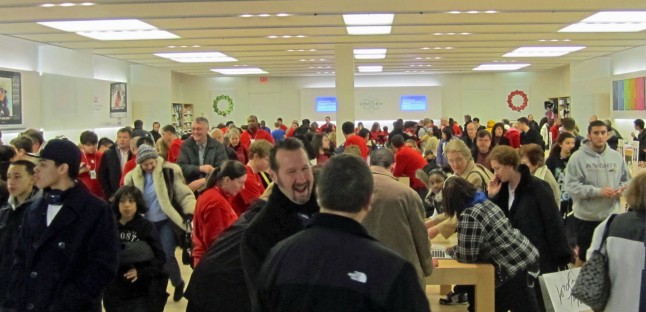Latest posts
A masterclass in creating value
What’s going on at parkrun?
Virtue-signalling all the way to the bank
Bud Light: brand purpose or virtue-signalling?
The Coddling of the American Mind, by Greg Lukianoff and Jonathan Haidt
Belonging, by Owen Eastwood
Such a simple thing
The Long Win, and The Scout Mindset
The Cult of We by Eliot Brown and Maureen Farrell
Coffee and covid modelling
By theme
Marketing strategy
Insight & metrics
Innovation & inspiration
Brand & positioning
Marketing communications
Business purpose
Leadership
By industry sector
Financial services
Retail
FMCG
Technology & start-ups
Consumer services
Business to business
Other sectors
By type
Books
Comment
Quotes
Thought leadership
Do you find queueing stressful? For me, it’s not the waiting, it’s the uncertainty. Give me an orderly queue with a guaranteed outcome at the end, and I can wait happily. Contrast that with the Apple store at Christmas. The dudes in their red t shirts and beanies are the same as always, chillaxed and cheerful. But in mid December, most people aren’t there for the joyous experience of a browse through all things Apple. We want service, and we want it fast, and if not fast, then we want our turn. The messy flow of people round the tables, staff all over the place, sitting at bars, standing around against pillars. All seems to indicate that it’s every man, woman and teenager for themselves. Surprising, then, that I didn’t take advantage when I was about to be served ahead of someone who’d been waiting longer. The Apple store experience was clearly designed for quiet browsing. Maybe it’s time to think again.
The SCARF model, devised by an Australian academic in leadership and coaching, David Rock, gives businesses another way to think about what people value, and how we can create more value for them, and hence for us. SCARF stands for Status, Certainty, Autonomy, Relatedness and Fairness. Rock says people respond positively when one of these is increased. Conversely, situations or behaviours that threaten someone’s status, autonomy and so on can trigger a visceral negative response. Applied to marketing, the SCARF model suggests people value, and will pay for, things that increase one or more of these factors. Status is one we marketers have always known about. Certainty is less obvious, until you start looking. Getting priority is one way: friends or members of an arts venue get priority booking, which delivers near-certainty blended with status. Paying extra for guaranteed delivery is another. Airlines have spotted this one. Speedy priority pre-boarding can double the price of your flight without getting you to your destination any sooner. The airports are getting in on it too. Book online for the car park at Gatwick and you can pay £5 per person to go through the premium security channel. I think they’ve made that one too cheap.
The ultimate expression of Autonomy is, I suppose, the fantasy about that last day at work after winning the lottery: there are so many ways one can make one’s feeling known about the boss/ the job/ the company before making a spectacular exit, perhaps by climbing out of the office window and leaving via the roof. I suspect even that would be a fleeting pleasure – fortunately there are many other ways to experience little moments of autonomy. Ever walked past a huge ticket queue to the pre-paid window? Or when you print your own tickets, securing freedom from any interaction with the ticket office staff. Autonomy is a win-win for businesses. Most people like to do things themselves if it puts them in control, along with rational benefits like saving time. This will usually save time and money for the business too. Notice how Odeon cinemas no longer have a separate ticket desk? So many people buy online that they’ve merged it with the popcorn counter, saving headcount. It can go wrong though if the customer feels coerced into a DIY approach, or if it looks like they’re doing the company’s work. It has to be good for them too, and it has to be a choice.
Relatedness and Fairness are about our humanity, and this is where we see the greatest dissonance between a classical economist’s view of the world – rational, money-driven, utility-maximising – and a behavioural economist’s view. Relatedness means safe relationships and connections with other people whom we trust. Fairness means we will sometimes disadvantage ourselves if it seems fairer. Not everyone feels these things but when I let the Apple guy know someone else is next, I’m showing that these things matter to me and influence my behaviour. Being fair to a stranger when you don’t have to and appear to gain nothing from it might not seem rational to an economist, but to a human it delivers a little moment of relatedness and fairness – a tiny connection with that stranger and a demonstration to you both of your fairness. The old saying, Money makes the world go around” must have been devised by an economist. I’s these little moments of human interaction that do it for me.
Latest posts
A masterclass in creating value
What’s going on at parkrun?
Virtue-signalling all the way to the bank
Bud Light: brand purpose or virtue-signalling?
The Coddling of the American Mind, by Greg Lukianoff and Jonathan Haidt
Belonging, by Owen Eastwood
Such a simple thing
The Long Win, and The Scout Mindset
The Cult of We by Eliot Brown and Maureen Farrell
Coffee and covid modelling
By theme
Marketing strategy
Insight & metrics
Innovation & inspiration
Brand & positioning
Marketing communications
Business purpose
Leadership
By industry sector
Financial services
Retail
FMCG
Technology & start-ups
Consumer services
Business to business
Other sectors
By type
Books
Comment
Quotes
Thought leadership
